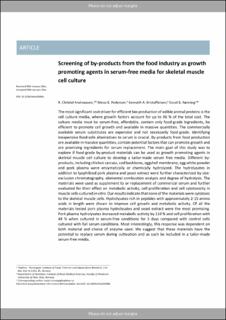| dc.contributor.author | Andreassen, R. Christel | |
| dc.contributor.author | Pedersen, Mona Elisabeth | |
| dc.contributor.author | Kristoffersen, Kenneth Aase | |
| dc.contributor.author | Rønning, Sissel Beate | |
| dc.date.accessioned | 2020-04-17T08:37:50Z | |
| dc.date.available | 2020-04-17T08:37:50Z | |
| dc.date.created | 2020-04-16T13:46:00Z | |
| dc.date.issued | 2020 | |
| dc.identifier.citation | Food & Function. 2020, 11 (3), 2477-2488. | en_US |
| dc.identifier.issn | 2042-6496 | |
| dc.identifier.uri | https://hdl.handle.net/11250/2651457 | |
| dc.description.abstract | The most significant cost driver for efficient bio-production of edible animal proteins is the cell culture media, where growth factors account for up to 96% of the total cost. The culture media must be serum-free, affordable, contain only food-grade ingredients, be efficient to promote cell growth and available in massive quantities. The commercially available serum substitutes are expensive and not necessarily food-grade. Identifying inexpensive food-safe alternatives to serum is crucial. By-products from food production are available in massive quantities, contain potential factors that can promote growth and are promising ingredients for serum replacement. The main goal of this study was to explore if food-grade by-product materials can be used as growth promoting agents in skeletal muscle cell culture to develop a tailor-made serum free media. Different by-products, including chicken carcass, cod backbone, eggshell membrane, egg white powder and pork plasma were enzymatically or chemically hydrolyzed. The hydrolysates in addition to lyophilized pork plasma and yeast extract were further characterized by size-exclusion chromatography, elemental combustion analysis and degree of hydrolysis. The materials were used as supplement to or replacement of commercial serum and further evaluated for their effect on metabolic activity, cell proliferation and cell cytotoxicity in muscle cells cultured in vitro. Our results indicate that none of the materials were cytotoxic to the skeletal muscle cells. Hydrolysates rich in peptides with approximately 2–15 amino acids in length were shown to improve cell growth and metabolic activity. Of all the materials tested pork plasma hydrolysates and yeast extract were the most promising. Pork plasma hydrolysates increased metabolic activity by 110% and cell proliferation with 48% when cultured in serum-free conditions for 3 days compared with control cells cultured with full serum conditions. Most interestingly, this response was dependent on both material and choice of enzyme used. We suggest that these materials have the potential to replace serum during cultivation and as such be included in a tailor-made serum-free media. | |
| dc.language.iso | eng | en_US |
| dc.title | Screening of by-products from the food industry as growth promoting agents in serum-free media for skeletal muscle cell culture. | en_US |
| dc.type | Peer reviewed | en_US |
| dc.type | Journal article | en_US |
| dc.description.version | submittedVersion | |
| dc.source.pagenumber | 2477-2488 | en_US |
| dc.source.volume | 11 | en_US |
| dc.source.journal | Food & Function | en_US |
| dc.source.issue | 3 | en_US |
| dc.identifier.doi | 10.1039/C9FO02690H | |
| dc.identifier.cristin | 1806628 | |
| dc.relation.project | Nofima AS: 201701 | en_US |
| dc.relation.project | Norges forskningsråd: 262300 | en_US |
| dc.relation.project | Nofima AS: 12274 | en_US |
| dc.relation.project | Norges forskningsråd: 280381 | en_US |
| cristin.ispublished | true | |
| cristin.fulltext | preprint | |
| cristin.qualitycode | 1 | |
